Water softeners are exposed to various chemicals and contaminants, including hard minerals, as water passes through them. The resin inside these units swaps magnesium and calcium with sodium ions in the ion exchange process. However, if the beads become too clogged with pollutants, they cannot effectively perform their function.
Water softener cleaners use chemicals to neutralize the buildup of such pollutants within the resin tank and remove them from the tank during the regeneration cycle.
There are multiple brands and types of water softener cleaners available on the market, but today we’ll share what are our top picks.
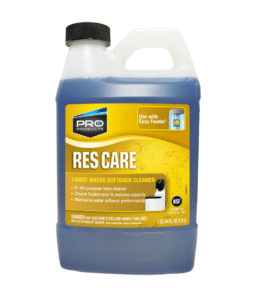
- Size – 64 oz / 4 lbs
- NSF Certified – NSF/ ANSI 60
- Price – $17.33
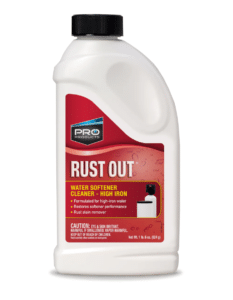
- Size – 76 Oz / 4.75 lbs
- NSF Certified – No
- Price – $28.23
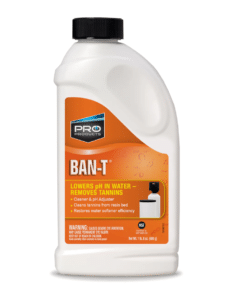
- Size – 64 Oz / 4 lbs
- NSF Certified – NSF/ ANSI 60
- Price – $36.30
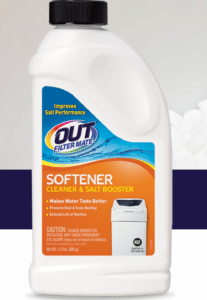
- Size – 25 Oz / 1.6 lbs
- NSF Certified – NSF/ ANSI 60
- Price – $9.27
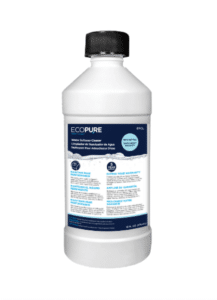
- Size – 16 oz / 1 lbs
- NSF Certified – No
- Price – $11.99
Water Softener Cleaners
RES CARE RK64N Water Softener Cleaner – Best All-Purpose Cleaner

- Size – 64 oz / 4 lbs
- NSF Certified – NSF/ ANSI 60
- Price – $17.33
- Removes a large variety of contaminants from your water softener system
- Has an NSF certification proving its effectiveness
- Pound-for-pound is the cheapest product on our list
- Isn’t suited for iron and rust removal
Water softeners are designed to remove heavy minerals from our water and nothing else. The problem is that most of the time, the water contains more than just high concentrations of calcium and magnesium. Other contaminants commonly found in water include heavy metals, viruses, bacteria, dirt, clay, etc.
So, if you don’t have an additional filtration system before the water softener to remove these contaminants, you’ll need to buy a cleaner like the RES CARE RK64N to prevent issues with clogging.
RES CARE RK64N is an all-purpose cleaning solution. Its classification means the cleaner neutralizes most of the common contaminants found in water systems. The chemicals inside this cleaner break down and loosen the contaminant molecules stuck on the resin beads, allowing the water softener to remove them during the regeneration process.
The product is NSF/ ANSI 60 certified, meaning it’s passed even stricter screenings and testing processes than standard products. Because of that, it’s one of the most trustworthy products on the market.
Additionally, while you’ll see products with a lower price tag on our list when you account for the packaging size, this product is pound-for-pound the most affordable cleaner.
The only real issue is that it’s not good at cleaning rust. Iron and heavy metals are tough to remove from resin tanks and require specific chemicals. The RES CARE RK64N removes iron to a certain degree but struggles with removing rust inside the tank.
RUST OUT RO65N Water Softener Cleaner – Best Iron Removal Cleaner

- Size – 76 Oz / 4.75 lbs
- NSF Certified – No
- Price – $28.23
- Very effective at removing iron and heavy metals from your resin tank
- Protects against rust and limescale buildup
- It’s not NSF certified
Most water softener cleaners use chemicals that combat various contaminants sticking to the resin beads inside your tank. In contrast, Rust Out RO65N is explicitly designed for removing iron molecules.
As we’ve explained, the resin beads in water softeners take magnesium and calcium ions and exchange them for sodium ions. However, most people don’t know they’re not as efficient at replacing iron molecules.
Allowing iron to accumulate to the point where it adheres to the resin beads reduces their effectiveness. This problem occurs because the built-up will leave only a tiny portion of the beads’ surface area functional for the ion exchange process.
The RO65N uses chemicals that remove common heavy metals found in water, like manganese and iron, while also removing other metallic molecules. Since these molecules are the main culprits of rust inside the resin tank, RO65N prevents oxidation and corrosion from damaging your water softener.
It also reduces limescale buildup inside the system and removes old rust stains. All these capabilities protect your water softener and significantly extend its life.
The one downside is that Rust Out RO65N is not NSF certified.
BAN-T RU64N Water Softener Cleaner – Best pH Modifying Cleaner

- Size – 64 Oz / 4 lbs
- NSF Certified – NSF/ ANSI 60
- Price – $36.30
- Doesn’t smell as foul as some of the other water softener cleaners
- Is capable of removing various acid-based contaminants and iron from your system
- NSF-certified
- The powder needs to be prepared before adding it to the system
BAN-T RU64N lowers the pH levels of your water to remove tannins. Tannin is a chemical substance comprised of several different phenolic acids. These acids come from plants and are commonly found in water supplies throughout the US.
Tannins thrive in high-pH environments, so lowering the pH level of your water effectively prevents them from spreading on your resin beads. Once the acids are neutralized, the regeneration process can eliminate them.
The low pH value also reduces the spread of rust and iron in your water softener. However, it’s less effective at preventing oxidation compared to the Rust Out RO65N, a product tailor-made for rust removal. Still, it prevents rust damage to some extent.
The BAN-T RU64N is also NSF certified, meaning that it’s considered to be one of the better products in this category out there.
Additionally, it comes in a powder form with a slight scent of lemon. The lemon scent is refreshing, as most water softener cleaners have a pungent smell that quickly permeates spaces. That said, we recommend handling the cleaner carefully since it’s still a strong cleaning chemical.
One minor issue with the BAN-T is its powder form. It’s just as effective as liquid cleaners but requires preparation by mixing it with water before adding it to the system. The process isn’t complex but time-consuming.
OUT Filter Mate® Water Softener Cleaner – Best General Powder Cleaner

- Size – 25 Oz / 1.6 lbs
- NSF Certified – NSF/ ANSI 60
- Price – $9.27
- Removes a large number of different contaminants
- Affordable
- Holds an NSF/ ANSI 60 certification
- Is in powder form and needs to be prepared before being added into the softener
Much like the RES CARE RK64N, this product is a general cleaner that neutralizes a wide variety of different contaminants, including viruses, bacteria, and soil particles from your resin beads.
If you live in an area with many contaminants in the water but don’t have a water purification system outside of a water softener, this is the product for you. It clears contaminants off your resin beads, keeps your tank in top shape, and significantly extends its life by at least a few years.
Out Filter Mate also reduces limescale and rust buildup. However, it’s ineffective at removing large rust patches from the inside of the tank or dealing with the side effects of water rich in heavy metals.
The product is very affordable, as you can get a 25oz bottle for just under $10. You also know you’re getting quality cleaner for that price since this product is NSF/ ANSI 60 certified.
As with the BAN-T RU64N, a possible downside to the OUT Filter Mate is its powder form.
On one hand, powders don’t smell as strongly as liquids, so you won’t feel them in the room long after you add them to the water softener. On the other hand, powder cleaners require preparation since you must mix them with water before adding them to the salt tank and starting the regeneration process.
So, some people avoid them as precise measurements are required before adding them to the system, and this process comes with a learning curve.
If the measurements are off and there’s not enough powder in the mix, the cleaner won’t be strong enough to remove contaminants from the resin beads. On the other hand, putting too much powder is wasteful and costly in the long run.
EcoPure EPCL Water Softener Cleaner – Best Small Container Cleaner

- Size – 16 oz / 1 lbs
- NSF Certified – No
- Price – $11.99
- Removes rust, tannins, and viruses
- Easy to measure and apply
- Extends the life of your water softener by 5 years
- Doesn’t hold an NSF certification
The EcoPure EPCL is able to keep your resin tank rust free for at least 4 months.
While the packaging seems small, it saves you quite a hassle. The 16oz bottle is the exact measurement you need to add to your salt tank. Then every 4 months, add another bottle of the EcoPure EPCL to keep your water softener consistently clean.
Speaking of the water softener, EcoPure claims their product extends the life of your device by at least 5 years, and we trust them. If you use this cleaner three times a year, you’ll significantly improve the condition of your resin tank for around $12 per bottle.
The EcoPure cleaner is an acid-based liquid solution, which tells you two things. First, it’s easy to use, and second, it takes care of tannins as well. As soon as you pour the cleaner into the water softener, the pH value of the water inside the tank will drop, making the environment less hospitable for tannins.
In addition, the EcoPure cleaner also removes iron and rust stains from your tank, as well as various bacteria, viruses, and more.
Its downside is not holding an NSF/ ANSI 60 certification. The certification isn’t strictly necessary, but it validates cleaning products.
How We Reviewed Water Softener Cleaners
The most important factors when picking out the best water softener cleaners include their purpose, type, NSF certification, size, and price.
Purpose
The most crucial factor to consider when choosing a water softener cleaner is the specific contaminants it’s designed to remove. Different water softener cleaners have different purposes, such as general-purpose cleaning (efficient against common contaminants), rust removal, or tannins removal by lowering the pH level of water.
When selecting a water softener cleaner, it’s vital to identify the specific contaminants in your water supply and choose a formulated product to effectively remove those contaminants. As we’ve seen, some products remove a wide range of pollutants, while others are developed for specific purposes and may only be effective against one or two contaminants.
| Model | Main Purpose |
| RES CARE RK64N Water Softener Cleaner | General-purpose cleaner: removes contaminants commonly found in water, including heavy metals, viruses, bacteria, dirt, clay, etc. |
| RUST OUT RO65N Water Softener Cleaner | Iron: removes manganese and iron molecules, heavy metal molecules, and rust buildup. Also, it prevents oxidation. |
| BAN-T RU64N Water Softener Cleaner | pH modifying cleaner: removes tannin acids and reduces the spread of rust and iron to some extent. |
| OUT Filter Mate® Water Softener Cleaner | General-purpose cleaner: removes common water contaminants that stick to the beads, such as sediment particles, bacteria, viruses, etc. |
| EcoPure EPCL Water Softener Cleaner | Acid-based cleaner: Capable of removing rust stains, hard mineral deposits, and tannins. |
Cleaner Type
When it comes to composition, there are powder and liquid cleaners. People generally prefer to buy liquid cleaners because they’re easier to use. You get a recommended dosage on the back of the bottle, and all you need to do is pour a certain amount of liquid into a measuring cup before adding it to the sodium tank.
Powder cleaners, on the other hand, need to be prepared by mixing the powder with water. The measurements can be finicky, and if you make it too weak, the cleaner won’t do its job.
However, powder cleaners don’t smell as bad as liquid cleaners and are usually slightly cheaper.
Both types of cleaners have pros and cons, and whichever you pick will depend on what you find more convenient.
| Model | Cleaner Type |
| RES CARE RK64N Water Softener Cleaner | Liquid Cleaner |
| RUST OUT RO65N Water Softener Cleaner | Liquid Cleaner |
| BAN-T RU64N Water Softener Cleaner | Powder Cleaner |
| OUT Filter Mate® Water Softener Cleaner | Powder cleaner |
| EcoPure EPCL Water Softener Cleaner | Liquid Cleaner |
NSF Certification
If you look at the label of the products, you may notice a sticker reading “NSF/ ANSI 60 Certified”. This certification means that these particular products have been approved by the National Sanitation Foundation as true to their claims.
So cleaners holding an NSF certification are more trustworthy and ensure consumer confidence.
Remember that just because a product doesn’t hold an NSF certificate doesn’t mean it’s ineffective. Cleaning products undergo stringent testing to ensure they’re effective and safe before being put on the market.
Still, knowing that an authoritative and independent institution tested and approved them goes a long way in showing they meet all public health and safety standards.
| Model | NSF Certified |
| RES CARE RK64N Water Softener Cleaner | Yes |
| RUST OUT RO65N Water Softener Cleaner | No |
| BAN-T RU64N Water Softener Cleaner | Yes |
| OUT Filter Mate® Water Softener Cleaner | Yes |
| EcoPure EPCL Water Softener Cleaner | No |
Size
The product’s size in terms of ounces and pounds is the lowest priority when picking out water softener cleaners, but it’s still a factor worth considering because it goes hand in hand with the price.
For example, if cleaner A is cheaper than cleaner B, but cleaner B is bigger, you’ll need to consider the price and weight before deciding which product is the better deal.
What’s more, depending on the water softener’s capacity, you may need to adjust the dosage accordingly. If the system has a larger capacity, a higher dosage may be required to clean the entire system effectively.
Cleaners come with specific instructions, so check the specifications to understand how to use the appropriate amount for the size and capacity of the system better.
| Model | Size |
| RES CARE RK64N Water Softener Cleaner | 64 oz / 4 lbs |
| RUST OUT RO65N Water Softener Cleaner | 76 oz / 4.75 lbs |
| BAN-T RU64N Water Softener Cleaner | 64 oz / 4 lbs |
| OUT Filter Mate® Water Softener Cleaner | 25oz / 1.6 lbs |
| EcoPure EPCL Water Softener Cleaner | 16 oz / 1 lbs |
Price
We’re confident that all of the items on our list are reasonably priced, so you won’t break the bank regardless which product you decide to go for in the end. However, if you want to get your money’s worth, the following table compares the prices of cleaners.
| Model | Price |
| RES CARE RK64N Water Softener Cleaner | $17.33 |
| RUST OUT RO65N Water Softener Cleaner | $28.23 |
| BAN-T RU64N Water Softener Cleaner | $36.30 |
| OUT Filter Mate® Water Softener Cleaner | $9.27 |
| EcoPure EPCL Water Softener Cleaner | $11.99 |
*The prices were accurate as of 10.03.2023 but are subject to change
What is a Water Softener Cleaner?
Water softener cleaners are designed to neutralize and loosen chemical molecules or mineral buildup sticking to the resin beads inside the main tank. They help softeners remain functional for longer.
Typically, contaminated water is filtered with a reverse osmosis system to remove pollutants before they reach the water softener. This setup prevents any potential damage to the resin beads.
However, if the water isn’t contaminated enough to warrant spending a few grand on a whole-house system, the next best solution is to use a cleaning product to prevent the deterioration of your water softener.
Cleaners won’t reduce the number of contaminants passing through the system, but they’ll neutralize the contaminants sticking to the resin beads inside the brine tank. In other words, they ensure the resin beads are clean and functional.
How Do Water Softener Cleaners Work?
Water softeners have two tanks – the resin tank and the salt/sodium tank. The resin tank is where the water softening takes place. The water passes through resin beads that are charged with sodium ions. The resin exchanges the calcium and magnesium ions in the water for the sodium ions.
Once the beads perform the ion exchange process for a certain amount of time, they need to be recharged with more sodium ions, and that’s where the sodium tank comes into play. The sodium tank uses water and salt to create a mesh that filters into the resin tank and passes over the resin beads to charge them with sodium ions again.
The resin tank can’t be opened, but the sodium tank has a removable lid allowing you to pour in the salt required for the regeneration process.
The salt tank has a PVC pipe called a float assembly. Your chosen water softener cleaner is poured inside the float assembly, and the regeneration process will automatically take in the cleaner chemicals and the salt.
Once the regeneration process is started, the cleaning is automatic. The cleaner will go through the resin tank and cover the resin beads. The chemicals and contaminants that were coating the beads will get loosened and detached from the resin beads. After this, the contaminant molecules will be floating in the water, and they’ll be removed from the resin tank once the water gets flushed from the system at the end of the regeneration cycle.
The cleaner will also coat the inside of the resin tank and loosen any rust or limescale that might have started to build up.
Types of Water Softener Cleaners
You can divide water softener cleaners into several categories based on what they do. For instance, some increase or decrease the pH value of the water, some remove rust, and general cleaners tackle various contaminants.
However, we can also divide them into powder and liquid based on their composition.
Liquids are much easier to apply since they don’t need to be mixed with water before being poured into the tank. The measurements are also much simpler since you only need to account for the cleaning liquid, whereas with powder cleaners, you need to account for both the powder and the water.
On the other hand, powders don’t smell so bad, and the vapor isn’t nearly as dangerous as with liquids. The chemicals are still harmful and should be handled carefully, but you won’t need to air out the room if you open a powder cleaner, which can’t be said about their liquid counterparts. Powder cleaners are also generally a bit cheaper than liquid cleaners.
Both types of water softener cleaners have their own unique advantages and disadvantages, but people generally prefer using liquids because they’re easier and quicker to use.
Frequently Asked Questions
In the next section, we’ll address some of the most commonly asked questions about water softener cleaners in an effort to provide clear and concise answers for those seeking information on the topic.
What is the cheapest water softener cleaner?
Almost all of the products on our list have different weights, so picking out the most affordable product isn’t as straightforward as picking the one with the lowest price tag.
However, pound for pound, we’d say that the RES CARE RK64N is the most inexpensive product.
What is the average price of a water softener cleaner?
The answer to this question depends on the size of the cleaner you’re buying. Usually, they go for anywhere between $5 to $50.
Smaller bottles that only weigh a pound are going to be under $20, whereas the larger 4-pound bottles go up to $50 or more, depending on the brand and quality.
Additionally, powder cleaners are usually cheaper than liquid cleaners since they’re perceived to be less efficient. The difference is negligible, but if you’d prefer to save $5 bucks, you should try a powder cleaner.
How do you use water softener cleaners?
Water softener cleaners are added to the float assembly inside the salt tank. To add them, open the top of the PVC pipe inside the tank and pour in the cleaner. The amount you add will depend on the product; as different brands have specific instructions.
Stick to the instructions provided by the manufacturer or read the recommended quantities outlined on the back of the bottle, and you should hit the right dosage.
Once the cleaner is inside the float assembly, close the top of the pipe, put the lid back on the tank, and manually start the regeneration cycle. The cleaner will automatically get sucked into the resin tank, where it will coat both the resin beads and the inside of the tank.
You’ll need to repeat the process every 4-6 months, depending on the recommendation written on the back of the product. You should generally try to maintain your softener at least 2-3 times a year. The process is straightforward and easy to do, so maintenance frequency shouldn’t be challenging to manage.
However, please keep in mind that these chemicals are strong. Anything that can strip rust from tanks will stink and be poisonous. When using these chemicals, ensure they don’t come into contact with your skin, keep your nose and eyes away from any fumes, and, if possible, wear a mask and protective gloves.
Conclusion
The RES CARE RK64N is the best all-rounder on our list. It’s versatile regarding the number of contaminants it removes, making it an excellent choice for just about any household.
The RUST OUT RO65N is your only option if you live in an area where the main concern is iron, rust, and heavy metals.
The BAN-T RU64N is best if your area has organic contaminants or bacteria.
The OUT Filter Mate® is a great general powder cleaner that removes most contaminants and doesn’t stink as much as liquid cleaners.
The EcoPure EPCL is suitable for general contaminants and removing iron. However, the fact that it’s not NSF-certified puts it slightly below the RES CARE RK64N as a general cleaner.